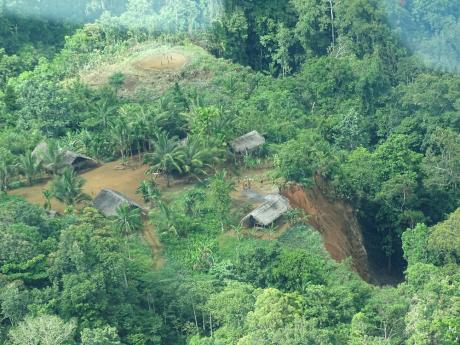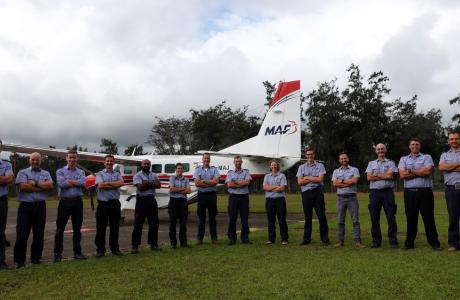
Pilots
What's it like to be a MAF pilot?
Hear from Danny Gill about his experience as a MAF pilot in South Sudan.

Are you considering a career change? Do you sense a God calling you into something new? Or have you dreamt of serving with MAF and the timing is now right?
Hear from some of our international staff about their experiences of serving overseas. In addition to sharing about their specialist area of work, some share about their journey into MAF, others about being on the mission field as a family.
Hear from Danny Gill about his experience as a MAF pilot in South Sudan.
Paul and Clare share about their journey into MAF and their experience serving in Papua New Guinea.
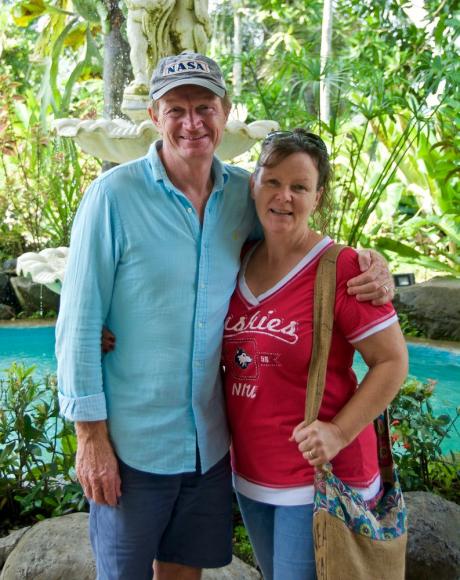
Paul: We are from the UK but we are Australian too. We left the UK to join MAF and, in doing so, became dual citizens.
Clare: Australia was the only place after 9-11 where we could do your mission aviation course. So we moved our family to Melbourne to go to the Bible College of Victoria, which has a new name now. We’ve been calling Wewak, PNG home for the last 5 years, but at the end of 2020 we were actually packing up in Wewak because we are just going to be moving wherever we’re needed rather than have a base assignment. We’re sad to leave Wewak – it’s a beautiful place and we’ve been so happy there.
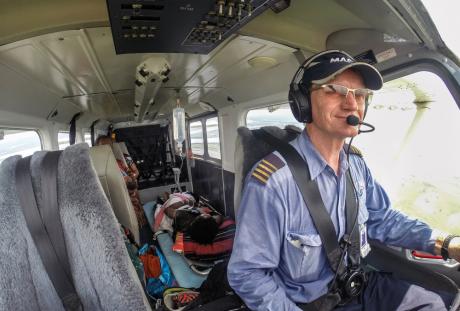
Clare: When the [Boxing Day] tsunami struck in 2004, it really made us re-evaluate our lives. I felt God was speaking to me during that tsunami. You know, so many people were going to help, leaving their comfortable lives, going and helping out in the Philippines and other places. I asked God if He was trying to tell me something; if He had a different life planned for us.
I was left feeling very unsettled, so when Paul came home from work and the kids were in bed I said, “Look, I’ve had this really weird day and I really feel that God is saying something. Do you think God is calling us to a different sort of life?”
I really thought he loved his job in the city of London and would say, no you can serve God wherever you are. We were settled in our dream home in England and very happy. But he surprised me by saying, “I’ve always wanted to be a mission pilot, I just never thought it could be a reality.”
We decided that we would start praying about it and asking other people to pray. If it was God’s will He’d open those doors for us. Very quickly we applied for a visa to go to Australia, for permanent residency leading to citizenship. We knew we wanted to become Aussies because we knew our kids would grow up as Aussies, they’d probably want to stay, and we needed free education. So, we applied to emigrate and we applied to MAF. In very short order we were accepted by both. We also managed to sell our house really quickly in a bad market. It was really a sign God was saying, let’s get going.
Paul: When we got married we joined a mission group and somebody from MAF Asia Pacific, we don’t know who, came and gave a presentation in 1990. That kind of seeded the idea.
Clare: I have to admit, I have no memory of that at all. But it stayed on Paul’s heart for many years.
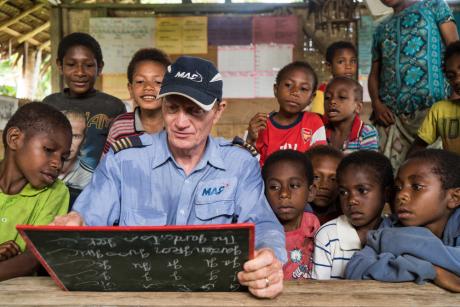
I have two roles, one as a pilot here in PNG and the other as a software writer for MAF.
For the last nearly eight years I’ve written and looked after the flight planning software. We also have a Route and Aerodrome Guide that I’ve been working on. Three years ago I brought it all together in an iPad ‘electric flight bag’ app called MAF Pilot. The app has the entire Route and Aerodrome guide, notices to pilots, the various details for each airstrip we fly to so pilots can see how to fly the airstrip, and pricing information for when the pilot is on the ground. It’s a MAFI project but it’s specific to PNG right now.
I really like the flying a lot. But I think everyone needs two roles here so that when you’re not flying, because of bad weather or something, you’re not just sitting on the ground. Being away from family is most challenging I think.
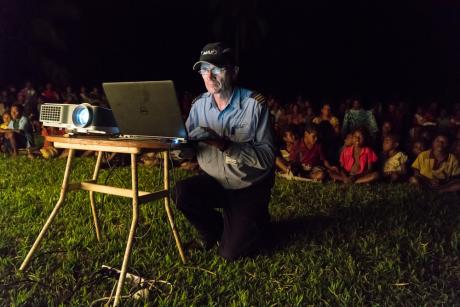
When we were in Goroka, our first posting in PNG, our son went to the New Tribes mission school at Lapilo and I got a job running the elementary library. It was only a part-time job, but I loved it because I love books, reading, and early education. I’ve been a librarian before even though I’m a nurse.
It’s been a bit harder in Wewak. I’ve done some preschool – play school, really, with lots of games and cooking. I also teach ladies how to sew things they can sell like washable sanitary products, school bags, and things like that. Now I’m hoping to teach people how to sew masks – I’ve brought all the stuff with me from Australia.
It was very difficult in Wewak. You can’t just randomly choose a local school because there are too many and jealousy can be an issue. A friend of mine was putting together baby packs and making washable sanitary products for a hospital in Anguganak (one of the places Paul flies to). I’ve been involved in that even after my friend left PNG. I put the ‘baby bundles’ together with all sorts of little things for mum and baby given to me by our supporters and people in Australia. I make the hospital baby bundles specifically for, and am supported by, the midwives of The Anguganak Healthy Motherhood Project, spearheaded by Debbie Butters. The bundles serve as an encouragement to ladies from remote communities to come to have their babies at the hospital for safety reasons.
So, that’s really what I do, sewing and putting these baby bundles together.

Clare: For me, it’s a way for us to serve the Lord, but it’s also a way to get involved with the local people and show our love for Jesus Christ by loving others. There’s so much need here, which gives us lots of opportunities to help others and teach.
Paul: I think it’s a great way, like Clare said, to serve the Lord, speak into people’s lives, and do something not many people can really do. MAF is quite a technical ministry and not many people access these communities the way we do. I think it’s great that we can help the people of PNG; they are so pleased we’re here.
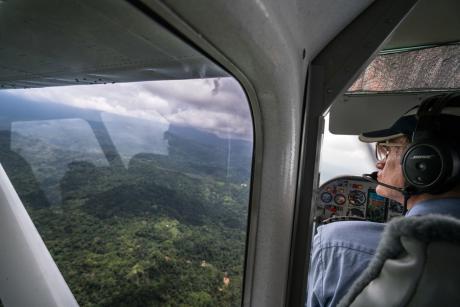
Paul: It’s a worthwhile trip, but you need to be committed. You can’t be committed for just four years – that’s too short. It takes so long to get going; a couple of years to get to the program, a year in program to get settled in, and about six years to be useful in flying in terms of being able to go everywhere. You need to be here for a lot longer than four years. We signed up for 25 years and have another 9 years to go.
Clare: This is sort of our second life and it will be our life until we retire if we ever retire.
Paul: I also think you need good life experiences before coming because it’s so easy to blame the program, to blame the environment, to blame everything when you have problems. If you’re in Melbourne, London, or New York you’ll still have problems. Problems are just different here, and sometimes a little bit worse. For example, if you have new children or are a first-time parent it’s a huge learning curve with struggles wherever you are. Saying it would’ve been easier in another country isn’t right; it wouldn’t necessarily be easy in any country. So, long term commitment is very important because it’s a long road with knocks along the way.
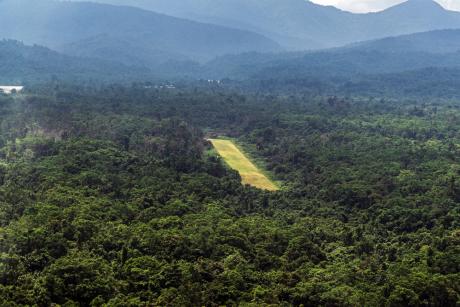
‘I was flying with Luke, my training captain for the Caravan C208, to April River to drop off some missionaries. On the way back we did some service flights with passengers from Malaumanda, Pyarulama to Kompian and Mount Hagen. It promised to be a short day, being back in Mount Hagen around lunch time. There was some office work waiting for me so I was grateful for the afternoon.
Back at base, ‘I was closing up the Caravan, and Luke was already in the pilots’ room finishing off paperwork when Sharlene, our Crisis Manager, arrived. An urgent relief flight was required to Muluma and Bosavi, in the earthquake area south of Komo.'
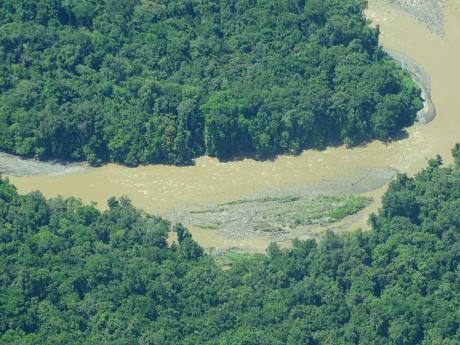
‘I was about to lock all the doors on the Caravan when Luke informed me. He had already created a flight plan and calculated the fuel load. I quickly informed the fuel tanker and started to pull all the engine plugs which I had just put on for the night.
‘We took off again with a fully loaded Caravan. On board: plastic bottles of drinking water, several bags of rice, tinned meat and fish, four rain catcher units, four bush toilets. The cargo was desperately needed because the earthquake had destroyed gardens, contaminated rivers (which are normally used for drinking water), and landslides had washed away the original bush toilets.'
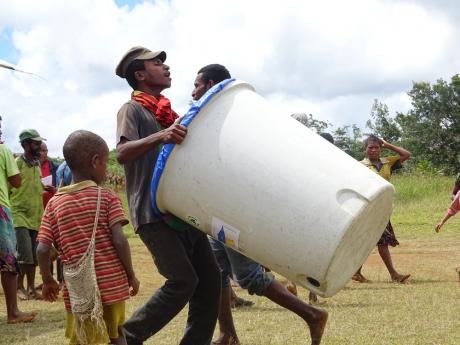
‘We departed Mount Hagen in good weather and visibility, passed the second highest mountain [in Papua New Guinea], Mt. Giluwe, and Mendi on the northern side, and flew as direct as possible to our first destination, Muluma.
The usual afternoon clouds were already forming on the ridges of the southern Highlands, making navigation difficult. The radio was constantly chattering with several relief aircraft and helicopters flying in and out of Moro, an airfield used as a hub for big aircraft bringing supplies in, and small aircraft and helicopters to take all the supplies to the earthquake-shaken villages.
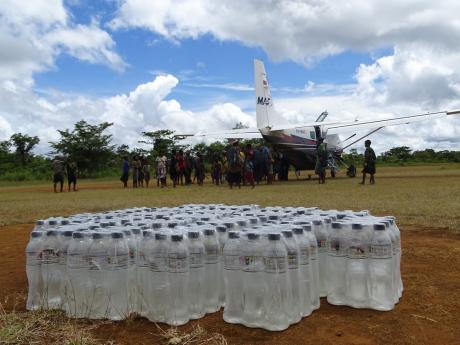
‘Because of time constraints we were not able to check out a lake which was forming in the Heggegio River valley as a result of landslides blocking the valley. The biggest fear was that the damn of dirt, rocks and logs would eventually give way to a big flood which would wash away everything close to the riverbanks. We needed to find a village which was reported close to the river and in possible danger of the flood.
‘I spotted a very small village with two major landslides and possible loss of houses and lives close to the Heggegio river and made a mental note of the position. On our way back to Hagen, we would fly at low level and get the coordinates of the village to set up a helicopter rescue mission.
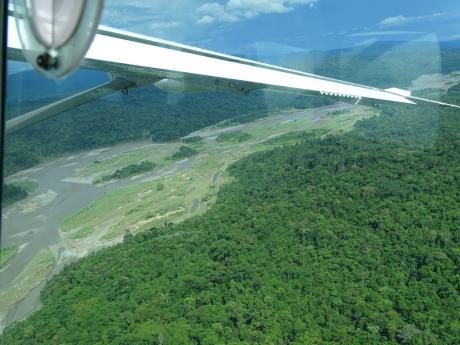
‘Landing in Muluma was challenging, because the afternoon west winds picked up dramatically, causing turbulence and wind shear on the short final. Fortunately the approach was into the wind so stopping was not an issue.
‘The people in Muluma greeted us with relief. Luke and I unloaded the first half of supplies. I realised that the rain catcher units and bush toilets required some training in order to be set up. The system is simple, but requires some work from the people. Using the Melanesian way of explaining important things at least three times, I made sure that the people standing close and watching understood how the setup worked.
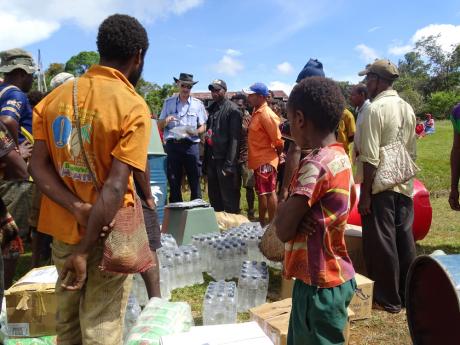
‘The rain catcher consists of a small round tank with a tarpaulin attached to the lid. The tarpaulin is held up by wooden sticks at the four corners and catches the rain. A strainer in the middle of the tarpaulin releases the water into the tank. A tap at the bottom of the tank is used to fill buckets or other containers.
‘The bush toilets were made of a steel drum with no top and bottom, and a toilet seat on top. The steel drum needed to be put in a hole, which needed to be dug first. Banana leaf and bush material would form walls and a roof for privacy.
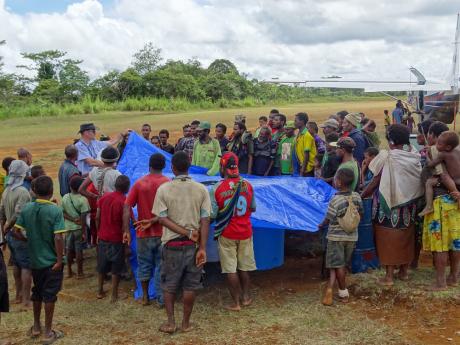
‘We took off again and after just an 11-minute flight we arrived over Bosavi. Because of the strong crosswinds we were not sure if a landing could be attempted. We started an approach to check the lower winds and determined that it was safe to land.
‘The people in Bosavi shared similar stories as the people in Muluma: they were afraid that the old, extinguished volcano, Mt Bosavi, would explode. They wanted to flee to the north, right into the unstable area of the previous major earthquake. We urged them to stay where they were. We unloaded the food, water, rain catcher units and bush toilets, and gave another lesson in how to set things up.
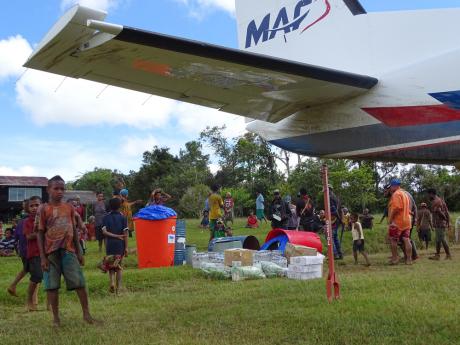
‘Time was running out and we needed to fly back to Mount Hagen before the afternoon thunderstorms developed, making a flight under Visual Flight Rules hard work.
‘We took off from Bosavi and attempted to find the village close to the Heggegio river. This time we made a low pass over the village. We could see several people waving at us, and it looked like they had prepared a helicopter landing side; there was no clearing big enough for an airstrip.
‘There were two major landslides close to the village houses. It was impossible to tell if houses had been taken down by the landslide. We quickly determined the coordinates and departed for Mount Hagen. Flying through the area, with several low-level flying helicopters doing relief work, was quite demanding. Huge cloud build ups also made navigation challenging, and the rain forced us to turn south of the ranges back to Mount Hagen.’
